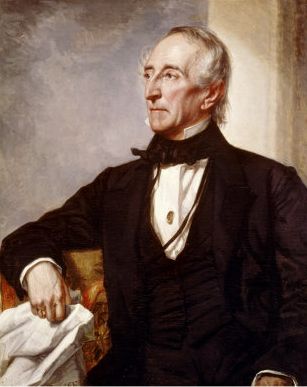Article 13, Sec. 1. In all
the present territory of the United States, north of the parallel
of 36 degrees 30 minutes of north latitude, involuntary
servitude, except in punishment of crime, is prohibited. In all
the present Territory south of that line, the status
of persons held to involuntary servitude or labor, as it now
exists, shall not be changed; nor shall any law be passed by
Congress or the Territorial Legislature to hinder or prevent the
taking of such persons from any of the States of this Union to
said Territory, nor to impair the rights arising from said
relation; but the same shall be subject to judicial cognizance in
the Federal courts, accoring to the course of the common law.
When any territory north or south of said line, within such
boundary as Congress may prescribe, shall contain a population
equal to that required for a member of Congress, it shall, if its
form of government be republican, be admitted into the Union on
an equal footing with the original States, with or without
slavery, as the constitution of such new State may provide.
Sec. 2. No Territory shall
be acquired by the United States, except by discovery and for
naval and commercial stations, depots, and transit routes,
without the concurrence of a majority of all the Senators from
States which allow involuntary servitude, and a majority of all
the Senators from States which prohibit that relation; nor shall
Territory be acquired by treaty, unless the votes of a majority
of the Senators from States from each class of States
heretobefore mentioned be cast as a part of the two-thirds
majority necessary to the ratification of such treaty.
Sec. 3. Neither the
Constitution nor any amendment thereof shall be construed to give
Congress power to regulate, abolish, or control, within any State
the relation established or recognized by the laws thereof
touching persons held to labor or involuntary service therein,
nor to interfere with or abolish involuntary service in the
District of Columbia without the consent of Maryland and without
the consent of the owners, or making the owners who do not
consent just compensation; nor the power to interfere with or
prohibit Representatives and others from bringing with them to
the District of Columbia, retaining, and taking away, persons so
held to labor or service; nor the power to interfere with or
abolish involuntary service in places under the exclusive
jurisdiction of the United States within those States and
Territories where the same is established or recognized; nor the
power to prohibit the removal or transportation of persons held
to labor or involuntary service in any State or Territory of the
United States to any other State or Territory thereof where it is
established or recognized by law or usage, and the right during
transportation, by sea or river, of touching at ports, shores,
and landings, and of landing in case of distress, shall exist;
but not the right of transit in or through and State or
Territory, or of sale or traffic, against the laws thereof. Nor
shall Congress have power to authorize any higher rate of
taxation on persons held to labor or service than on land. The
bringing into the District of Columbia of persons held to labor
or service, for sale, or placing them in depots to be afterwards
transferred to other places for sale as merchandize, is
prohibited.
Sec. 4. The third paragraph
of the second section of the fourth article of the Constitution
shall not be construed to prevent any of the States, by
appropriate legislation, and through the action of their judicial
and ministerial officers from enforcing the delivery of fugitives
from labor to the person to whom such service or labor is due.
Sec. 5. The foreign slave
trade is hereby forever prohibited; and it shall be the duty of
Congress to pass laws to prevent the importation of slaves,
coolies, or persons held to service or labor, into the United
States and the Territories from places beyond the limits thereof.
Sec. 6. The first, third,
and fifth sections, together with this section of these
amendments and the third paragraph of the second section of the
first article of the Constitution, and the third paragraph of the
second section of the fourth article thereof, shall not be
amended or abolished without the consent of all the States.
Sec. 7. Congress shall
provide by law that the United States shall pay to the owner the
full value of his fugitive from labor, in all cases when the
marshall or other officer, whose duty it was to arrest such
fugitive, was prevented from so doing by violence or intimidation
from mobs or riotous assemblages, or when, after arrest, such
fugitive was rescued by like violence and intimidation, and the
owner thereby deprived of the same; and the acceptance of such
payment shall preclude the owner from further claim to such
fugitive. Congress shall provide by law for securing to the
citizens of each State the privileges and immunities of citizens
in the several States.
|
